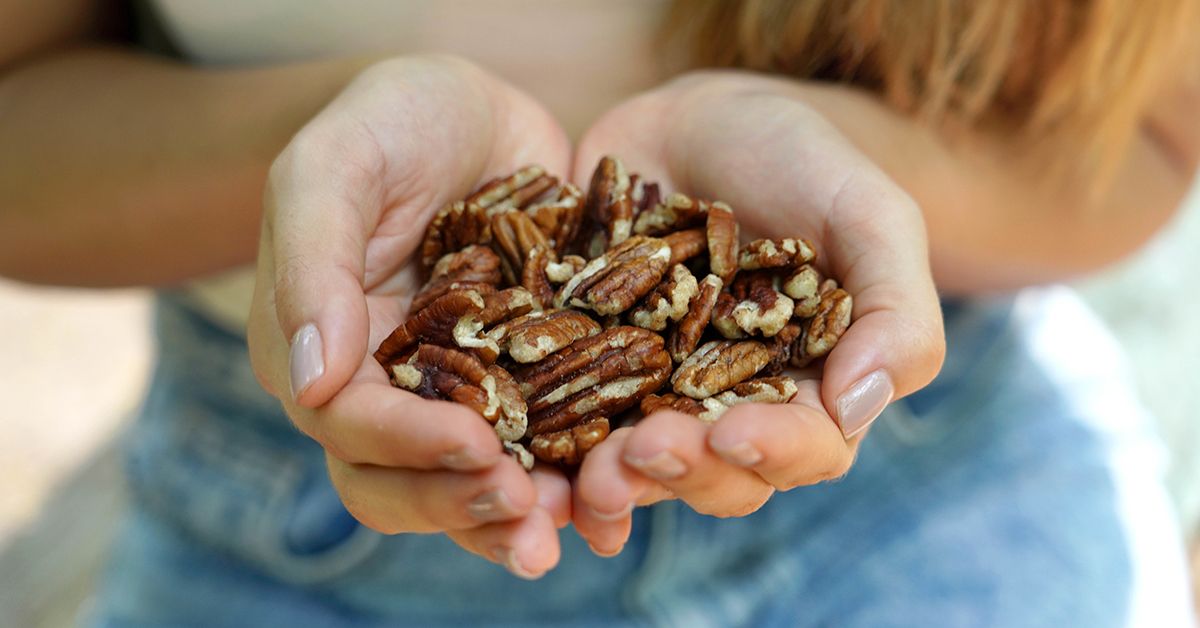
Pecans may help lower cholesterol and triglyceride levels, reducing the risk of heart disease. They also have beneficial antioxidant and anti-inflammatory properties. But moderation is key.
If you’ve ever pored over a list of recommended foods for a heart-healthy diet, you’ve probably seen “nuts and seeds” represented. That’s because these protein-rich foods contain high amounts of heart-healthy substances.
Recent research has found that pecans may be especially beneficial for people at risk of heart disease. Here’s what the science says about this superfood and your heart health.
Pecans can help lower cholesterol
Several studies suggest that pecans may be especially helpful at lowering total cholesterol and low-density lipoprotein (LDL), or “bad” cholesterol, levels.
For example, a 2025 study observed people at risk of heart disease who replaced their regular snacks with pecans. After 12 weeks, researchers found lower total and LDL cholesterol levels in those who snacked on pecans.
A similar 2021 study found that eating pecans helped reduce LDL by up to 9.5% after 8 weeks.
Key cholesterol-reducing properties of pecans include:
- Pecans contain plant sterols: Plant sterols are similar in structure to cholesterol, but have a few slight chemical differences. Your body absorbs them instead of cholesterol, which gets eliminated from your body.
- Pecans contain healthy fats: Pecans are rich in both monounsaturated fatty acids (MUFAs) and polyunsaturated fatty acids (PUFAs) compared to other nuts. Consuming more MUFAs and PUFAs in your diet can help lower LDL cholesterol.
- Pecans are low in unhealthy fats: Pecans are low in saturated fat. A diet high in saturated fat can contribute to high cholesterol.
- Pecans are rich in fiber: While they don’t quite match up to almonds, pecans are still one of the better nuts for dietary fiber. Soluble fiber can help prevent your body from absorbing too much cholesterol.
Pecans can help lower triglycerides
Like cholesterol, triglycerides are lipids (fats) that circulate in your blood. While you need triglycerides to store energy, too much can be dangerous for your heart.
While high cholesterol and high triglycerides often occur together, they don’t have to. Doctors test for both on a lipid panel.
The previously mentioned studies from 2021 and 2025 that examined cholesterol levels after pecan consumption also looked at the effect on triglycerides. Both studies found that the control group (those who didn’t eat more pecans) experienced an increase in triglyceride levels, while those who ate more pecans experienced a decrease.
Can pecans help lower blood pressure?
A 2025 research review of 115 studies notes that while nuts may help with total cholesterol, LDL, and triglycerides, no evidence suggests they can affect blood pressure.
However, a 2023 study notes that older adults experience better microvascular reactivity (MVR) after eating pecans. MVR is the ability of your small blood vessels to react to changes in the body. Better MVR reflects better blood flow.
Researchers propose that long-term consumption of pecans may help improve the function of both small and large blood vessels over time. However, more research is needed.
Other heart health benefits of pecans
Pecans are rich in antioxidants, substances that protect your body from unstable molecules. Antioxidants protect the heart by reducing oxidative stress, which can damage the heart and lead to heart disease, high blood pressure, and atherosclerosis.
Antioxidants in pecans include:
- gamma-tocopherol (a form of vitamin E)
- flavonoids
- ellagic acid
- polyphenols
Pecans also have anti-inflammatory properties, meaning they may reduce and prevent inflammation in the body. Inflammation can contribute to heart disease risk.
Are there downsides to eating pecans?
Pecans are high in calories. One serving of pecans (about 1 ounce or 19 halves) contains 196 calories, about the same as a cup of spaghetti or 2 small Fuji apples.
It’s important to eat pecans in moderation to avoid consuming too many calories. Excessive calorie intake can lead to weight gain, which can harm heart health. A 2022 study found that moderate pecan consumption (68 grams per day) for 8 weeks did not result in significant weight gain.
You should also consider what’s added to the pecans. Pecans with added salt may not be good for people with high blood pressure. Pecans with added sugar, such as in pralines or candies, can raise triglyceride levels and contribute to weight gain.
Some people may be allergic to pecans. If you notice symptoms like digestive issues, skin reactions, swelling, or difficulty breathing, stop eating pecans right away and talk with a doctor about your symptoms.
Pros of pecans for heart health
- can lower LDL (“bad”) cholesterol and total cholesterol
- can lower triglycerides
- antioxidant and anti-inflammatory properties help protect the heart
Cons of pecans for heart health
- may not help reduce blood pressure
- may cause weight gain if not consumed in moderation
- added ingredients, like sugar or salt, can cancel out health benefits
Takeaway
Replacing regular snacks with pecans may help lower cholesterol and triglyceride levels in people at risk of heart disease. Pecans may also offer other significant heart health benefits, such as being rich in antioxidants and preventing inflammation.
Still, it’s important to consume pecans in moderation, as they’re high in calories. For best results, avoid pecans with added salt or sugar.
